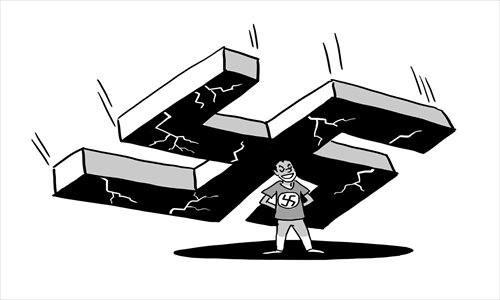WWII education in Asia sorely needed

WWII is long past, only its scenes are now commonplace in movies, novels and computer games.
However, in order to put an end to wars and massacres, we must launch a comprehensive, accurate and profound education campaign about WWII history.
Thailand has faced a barrage of criticism because of its inadequate WWII education recently. Students in Chulalongkorn University depicted Adolf Hitler alongside heroes such as Superman and Captain America on a mural recently.
Once on display, the mural caught the attention of Western media. Under the pressure of heavy condemnations from some Western embassies, NGOs and Jewish organizations, the authorities of this university made a public apology.
But the Hitler mural is not an isolated incident. Similar cases have been seen several times in recent years.
Last year in a new mall in Bangkok, a T-shirt shop printed a portrait of Hitler on its clothes, and set up a bust of the dictator outside the door. The Israeli ambassador to Thailand immediately lodged a protest. The owner finally gave up and removed the statue.
Back in 2011, some high school students in the northern city of Chiang Mai dressed in Nazi uniforms and armbands to march in the opening ceremony of a sports meeting. This issue aroused solemn protests from foreign diplomats based in the city who had been invited to attend the ceremony.
Several years earlier in Pattaya, a famous tourist resort in Thailand, a giant roadside billboard featuring Hitler's portrait was dismantled under the protests by the embassies of Germany and Israel to Thailand.
Why are German and Israeli embassies so watchful over depictions of Hitler and Nazi iconography? Because Hitler and the Nazis resonate among the worst moments of human history, and should never be used for marketing stunts in business or the arts.
Nazism is perhaps the most abhorrent of human ideologies, and fascism has become synonymous with bloodshed. These fundamental truths should be stressed and reiterated from primary school to university.
What we can be sure of is that history classes that Germans and Israelis receive are definitely different from those in Thailand.
The morbid craze for Hitler in Thailand has proved the necessity for Asian countries to deepen education about WWII. It has also uncovered the acute lack of awareness about the horrific, inhumane consequences of wars.
In most Asian countries, historical education about WWII is still limited to some simple historical facts such as who participated in the war. Besides, most literary works on WWII also fail to answer many questions - they do not seek to serve as a guide to explore the deeper meaning of human nature and wars.
There is no doubt that history classes should be based on an accurate and objective description of facts. But they also seek to open the horizons of younger generations so they may gain a full picture about the nature of wars and the horrors of the past.
The lack of understanding about WWII in some Asian countries is caused by a lack of appropriate education. As Asia enters a new era of development, these gaps in education are producing more and more problems.
It should be noted that strengthening such education and research does not mean dividing factions based on the sides Asian powers picked in WWII. It is simply about clarifying the basic historical tenets that are critical to any study of the conflict.
What matters most is how to clearly recognize the inhumane nature of wars. Whether young generations in Asia can reach a consensus about justice will determine whether Asia can obtain a peaceful and progressive future.
The author is a senior editor with People's Daily. He is stationed in Brazil. dinggang@globaltimes.com.cn